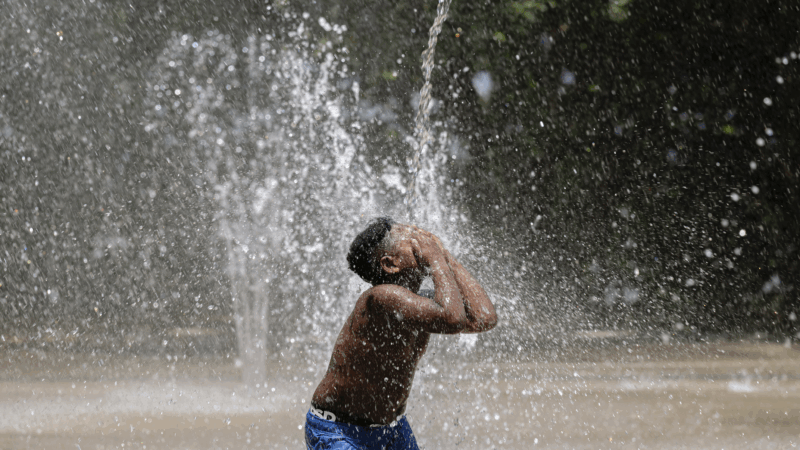Early-season heat dome brings highest temperatures in years to parts of Eastern U.S.
NEW YORK — An intense and nearly historic weather pattern is cooking much of America under a dangerous heat dome this week with triple-digit temperatures in places that haven’t been so hot in more than a decade.
The heat wave is especially threatening because it’s hitting cities like Boston, New York and Philadelphia early in the summer when people haven’t gotten their bodies adapted to the broiling conditions, several meteorologists said. The dome of high pressure that’s parking over the eastern United States is trapping hot air from the Southwest that already made an uncomfortable stop in the Midwest.
A key measurement of the strength of the high pressure broke a record Monday and was the third-highest reading for any date, making for a “near historic” heat wave, said private meteorologist Ryan Maue, a former National Oceanic and Atmospheric Administration chief scientist. The worst of the heat was likely to peak for Northeastern cities on Tuesday, forecasters said.
“Like an air fryer, it’s going to be hot,” Maue said. “This is a three-day stretch of dangerous heat that will test the mettle of city dwellers who are most vulnerable to oppressive heat waves.”
A heat dome occurs when a large area of high pressure in the upper atmosphere acts as a reservoir, trapping heat and humidity. A heat wave is the persistence of heat, usually three days or more, with unusually hot temperatures.
Where the heat will be worst
Nearly three-quarters of the country’s population — 245 million people — will swelter with 90 degrees Fahrenheit (about 32 Celsius) or higher temperatures on Monday, and 33 million people, almost 10% of the country, will feel blistering 100-degree heat (about 38 Celsius) on Tuesday, Maue said. The government’s heat health website showed the highest level of heat risk in swaths from Chicago to Pittsburgh and North Carolina to New York.
Those triple-digit air temperatures — with the feels-like index even worse because of humidity — are possible in places where it’s unusual. New York hasn’t seen 100 degrees since 2011 and Philadelphia, which is forecast to have consecutive triple-digit days, hasn’t reached that mark since 2012, said Climate Central chief meteorologist Bernadette Woods Placky.
In downtown Baltimore, temperatures climbed into the high 90s by early Monday afternoon, bringing dozens of people to cool off at St. Vincent de Paul’s resource center. A few blocks away, the city’s historic Broadway Market food hall closed early when the building’s air conditioning broke.
The heat forced the cancellation of events in west Baltimore, said Eric Davis Sr., who spends most of his days working at a baseball field there.
“You can’t have kids getting heat stroke,” he said. “It’s just too hot today.”
NOAA meteorologist David Roth said it takes time to acclimate to summer heat and this heat dome could be a shock for some.
“You’re talking about some places that could be 40 degrees warmer than last week. So that’s a big deal,” he said.
Climate change is making Earth warmer
The heat is part of Earth’s long-term warming. Summers in the United States are 2.4 degrees (1.3 degrees Celsius) hotter than 50 years ago, according to NOAA data. Human-caused climate change has made this heat wave three times more likely than without the burning of coal, oil and gas, the climate science nonprofit Climate Central calculated, using computer simulations comparing the current weather to a fictional world without the industrial greenhouse gases.
A key question is how much humidity will add to the discomfort and danger of the heat.
Maue is forecasting dry air which may be a degree or two or three hotter than predicted by NOAA, but more comfortable. Other meteorologists expected worse: Sticky, humid and even more dangerous.
“The ‘big deal’ will be with the humidity being provided with the wet late spring conditions,” said University of Oklahoma meteorology professor Jason Furtado. “The area of high pressure will allow for a lot of evaporation to occur from the wet grounds locally and regionally, which will increase the heat indices quite a bit.”
Woods Placky said to expect dew points, a key measure of humidity, in the 70s. That’s downright tropical, with some places approaching a dew point of 80 — a level Woods Placky said feels like “you’re in a swimming pool” and “the atmosphere is absorbing you.”
If this heat were later in the summer, it might not be as dangerous because the human body can adjust to the seasonably warmer temperatures, but this one is coming within days of the solstice, Woods Placky and others said.
“It will be a shock to the system,” she said.
Pentagon shifts toward maintaining ties to Scouting
Months after NPR reported on the Pentagon's efforts to sever ties with Scouting America, efforts to maintain the partnership have new momentum
Why farmers in California are backing a giant solar farm
Many farmers have had to fallow land as a state law comes into effect limiting their access to water. There's now a push to develop some of that land… into solar farms.
Every business wants your review. What’s with the feedback frenzy?
Customers want to read reviews and businesses need reviews to attract customers. But the constant demand for reviews could be creating a feedback backlash, experts say.
Tariffs cost American shoppers. They’re unlikely to get that money back
After the Supreme Court declared the emergency tariffs illegal, the refund process will be messy and will go to businesses first.
Civil rights leaders say the racial progress Jesse Jackson fought for is under threat
Activists say racial progress won by the Rev. Jesse Jackson is under threat, as a new generation of leaders works to preserve hard-fought civil rights gains.
‘Get back to integrity’: Oklahoma’s Kevin Stitt on Republicans after Trump
NPR's Steve Inskeep asks Oklahoma Gov. Kevin Stitt about his spat with President Trump, immigration and the future of the Republican Party.






